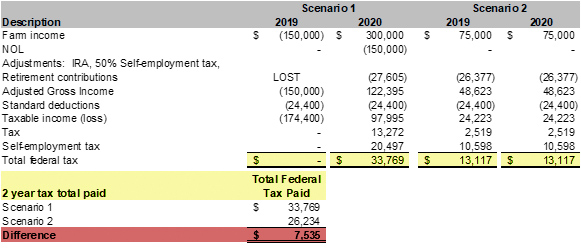
ISSUE
A month ago, I discussed in an article the impact that PPP loan forgiveness may have on your farm operation’s income taxes. In the article I expressed the importance of tax planning.
Rewind a bit more to the end of 2019, and you were reading an article about the importance of tax planning when I conveyed it was more important than ever and I provided tactics farmers could consider to “increase” taxable income given the economic landscape of farming last year.
Now, somehow, income tax planning seems even more important in this crazy 2020 year! This year the government has stepped in as a result of the impact of COVID-19 on our economy and farmers have received aid in the form of PPP, CFAP 1, CFAP 2, EIDL Advances, and various other grants. Some are taxable, some are not, some may or may not be – it’s confusing! That’s why farmers need to make sure their books and records are in good order for 2020 and meet with their tax advisors to see how this year is shaping up because this year’s government support may significantly impact taxable income.
Don’t make the mistake of thinking that tax planning isn’t important because we are in the middle of a global economic crisis caused by COVID-19. Tax planning is always critical to running your farming operation and I would argue that this year with COVID-19, tax planning is more important now than ever!
GOALS
Tax planning is the steps taken to minimize tax liabilities to ensure all available allowances, deductions, exclusions and exemptions are working together in the most tax-efficient manner and to reduce the total income tax paid to an amount a customer is anticipating. Most importantly though, effective tax planning helps customers avoid surprises come tax season.
Effective tax planning helps businesses achieve their financial goals and plan for their upcoming needs. In fact, it should lower taxable income, reduce tax rates, provide for greater control of when taxes get paid, and maximize deductions and credits whenever possible.
This simplified illustration shows the importance of tax planning. In both scenarios the two-year combined farm net income is $150,000 (average of $75,000 per year). In Scenario 1, no tax planning was completed and a significant loss was recognized in year one. This led to the income tax benefit of adjustments and standard deductions being wasted and the taxpayer paying $7,535 more in income tax over a two-year period than in Scenario 2.

Effective tax planning should avoid situations like scenario 1 and provide the tax savings shown in Scenario 2.
FARMERS’ RESPONSIBILITIES
This may come as a surprise, but your tax accountant is not a magician, nor are they a mind reader. You have to be a part of the tax planning if you want to ensure efficient and effective tax planning. Here’s a few tax planning tips:
Get your records in order: Having an accurate set of financial records is critical for a tax preparer. This doesn’t mean a shoebox with a bunch of receipts. A computer program or a worksheet that reconciles back to your bank statements and debts should be completed, at a minimum. If you don’t have that set up and either do not have the interest or ability, consider getting help with your bookkeeping. It’s part of the operation that can’t be ignored!
Don’t procrastinate: Putting off organizing your records until the last minute is a big no-no. Waiting until late in December to start your bookkeeping for the year leaves you scrambling to complete activities to help your tax situation.
Get off autopilot: It is not uncommon to see farmers make financial decisions they really shouldn’t have made because their books are not up to date. Examples include buying the same amount of prepaids as last year or making a capital expenditure because you had to last year – only to find out that neither were necessary because you were in a loss position. The opposite may be true this year with the government aid you may have received.
Nothing is irrelevant: Make sure you tell your tax preparer about all equipment purchases. If equipment is dealer or manufacturer-financed, it may not show up in your bank accounts if no payment was made in the tax year. That can be a sizeable capital expenditure that your tax accountant doesn’t know about unless you tell him.
Meet with your tax accountant: Meet before the end of the year to discuss your current financial situation and what tax bracket you’re likely to be in. Allow enough time to bring in additional income if facing a net operating loss or to make additional purchases if your income is too high.
Don’t be a victim with your income tax situation. Do what you can to control your income tax situation.
FREQUENT TAX PLANNING STRATEGIES
There are a few tax planning strategies you should be aware of. Not all of them may be applicable given your operation’s circumstances, but are important for you to have on your radar.
Methods to decrease taxable income:
Farm income averaging: averaging all or some of your farm income using rates from the three prior years.
Common expenditures to reduce taxable income: prepaying inputs and other allowed items, capital expenditures, and retirement contributions. Depending on your entity structure, retirement plan contributions can be significant, especially for self-employed individuals via a SEP, simple or other qualified plan. This also establishes retirement assets outside of the farming operations – diversification is a good thing!
Healthcare deductions: creating an employee benefits deduction to allow for business deduction of these expenses.
Selling under a deferred contract: you can sell grain before the end of the year, but not be paid until after the first of the next year. You then have flexibility to decide, after the fact, if you need additional income in the year that the crop was sold. Make sure you sell in several small contracts rather than one large contract to provide more flexibility for when to show income. Also, consider the risk of collection in your decision-making process.
Methods to increase taxable income:
Election to capitalize repairs rather than expensing them: it can be adjusted annually.
Maximizing depreciation methods, including direct and bonus expenses: try to never depreciate your way out of standard deductions and exemptions.
If a farm loss is inevitable, common ways to increase income include: IRA distributions, IRA to Roth IRA conversions, sale of non-farm capital assets (i.e. stocks). An IRA to Roth IRA conversion generates taxable income on the tax return, but the earnings are tax free. Any farm losses may be offset by the income generated from the rollover and no income taxes would be owed on the money rolled into the IRAs.
WRAP-UP
Not to be a broken record, but in closing I will reiterate that tax planning is just as important in low income years as it is in high income years – even more important in years like 2020 with significant government subsidies.
Keep your records up to date to help you can make educated decisions and receive sound advice. Go into your tax planning sessions with the mindset that nothing is irrelevant and remember your tax accountant can’t read your mind. Control what you are able to control and let your tax accountant help!
Strategies listed within this article are commonly used; however, everyone’s situation and position is unique. Our tax accountants at GreenStone evaluate your business and work individually with you to identify the best solutions to achieve your financial needs.
*As originally published in Michigan Farm News.


